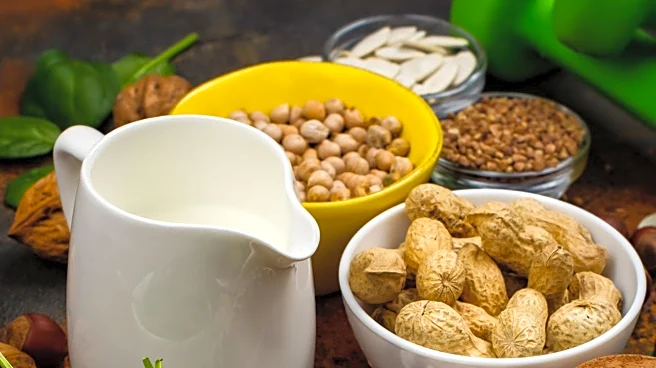What's Happening?
Dietitians are emphasizing the importance of high-protein foods for women over 50 to maintain muscle and bone health. As women age, particularly post-menopause, the natural decline in estrogen can accelerate the loss of muscle and bone mass. To counteract this, experts suggest incorporating foods like salmon, strained Greek-style yogurt, cottage cheese, tofu, beans, lentils, and chicken into regular meals. These foods not only provide protein but also offer other essential nutrients such as calcium, vitamin D, omega-3 fatty acids, and fiber, which are crucial for healthy aging. Research indicates that consuming at least 1 to 1.2 grams of protein per kilogram of body weight daily, combined with regular exercise, can help maintain or increase skeletal muscle mass.
Why It's Important?
The focus on high-protein diets for women over 50 is significant due to the health challenges associated with aging, such as increased risk of fractures, heart disease, and metabolic syndrome. Protein-rich foods like salmon and tofu provide essential nutrients that support heart health and may reduce inflammation, which is particularly important post-menopause when cardiovascular risk increases. Additionally, foods like black beans and lentils offer fiber that supports metabolism and insulin sensitivity, reducing the risk of metabolic syndrome. By prioritizing these foods, women can maintain strength, independence, and overall health as they age, potentially reducing healthcare costs and improving quality of life.
What's Next?
Women over 50 are encouraged to integrate these high-protein foods into their diets consistently to reap the health benefits. Dietitians may continue to advocate for personalized nutrition plans that address individual health needs and preferences. As awareness grows, there may be an increase in demand for these foods, potentially influencing market trends and availability. Additionally, further research could explore the specific impacts of high-protein diets on aging populations, leading to more refined dietary recommendations.
Beyond the Headlines
The emphasis on high-protein diets for older women highlights broader societal shifts towards personalized nutrition and preventive health care. This trend reflects a growing recognition of the importance of diet in managing age-related health issues and maintaining quality of life. It also underscores the need for accessible nutrition education and resources to empower individuals to make informed dietary choices.









